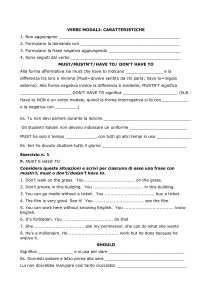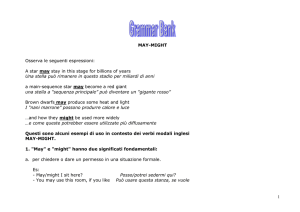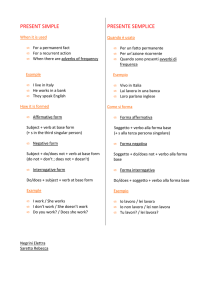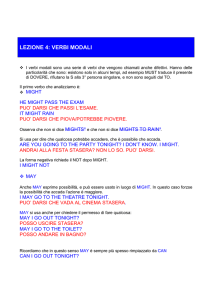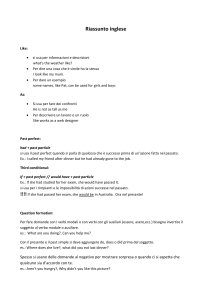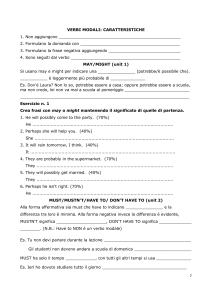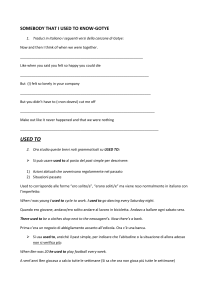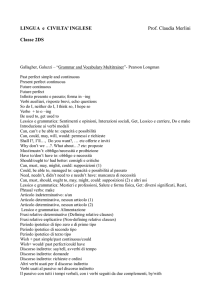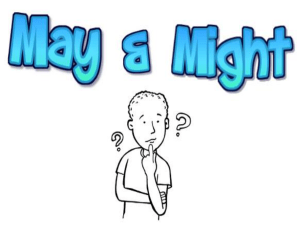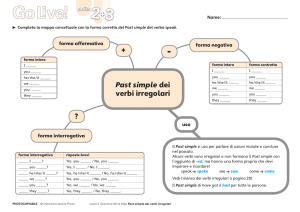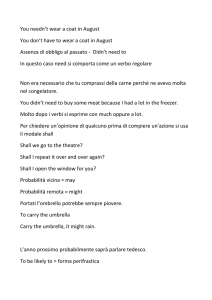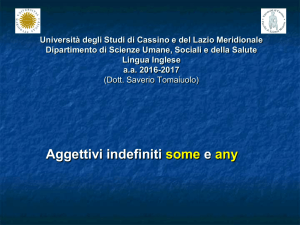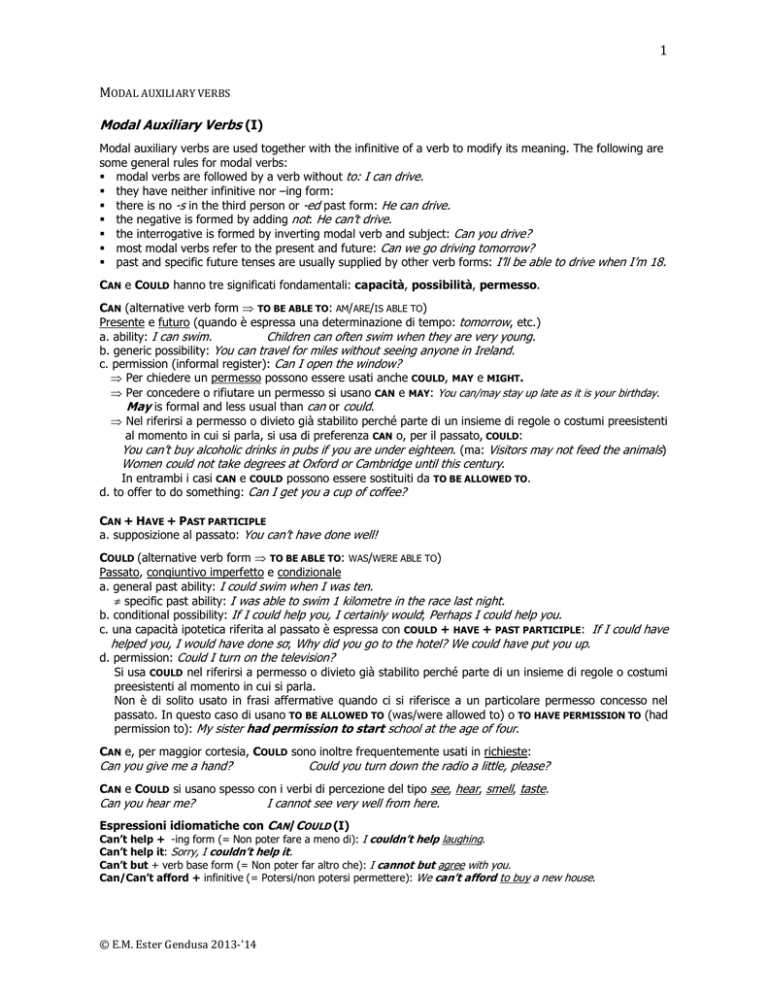
1
MODAL AUXILIARY VERBS
Modal Auxiliary Verbs (I)
Modal auxiliary verbs are used together with the infinitive of a verb to modify its meaning. The following are
some general rules for modal verbs:
modal verbs are followed by a verb without to: I can drive.
they have neither infinitive nor –ing form:
there is no -s in the third person or -ed past form: He can drive.
the negative is formed by adding not: He can’t drive.
the interrogative is formed by inverting modal verb and subject: Can you drive?
most modal verbs refer to the present and future: Can we go driving tomorrow?
past and specific future tenses are usually supplied by other verb forms: I’ll be able to drive when I’m 18.
CAN e COULD hanno tre significati fondamentali: capacità, possibilità, permesso.
CAN (alternative verb form ⇒ TO BE ABLE TO: AM/ARE/IS ABLE TO)
Presente e futuro (quando è espressa una determinazione di tempo: tomorrow, etc.)
a. ability: I can swim.
Children can often swim when they are very young.
b. generic possibility: You can travel for miles without seeing anyone in Ireland.
c. permission (informal register): Can I open the window?
⇒ Per chiedere un permesso possono essere usati anche COULD, MAY e MIGHT.
⇒ Per concedere o rifiutare un permesso si usano CAN e MAY: You can/may stay up late as it is your birthday.
May is formal and less usual than can or could.
⇒ Nel riferirsi a permesso o divieto già stabilito perché parte di un insieme di regole o costumi preesistenti
al momento in cui si parla, si usa di preferenza CAN o, per il passato, COULD:
You can’t buy alcoholic drinks in pubs if you are under eighteen. (ma: Visitors may not feed the animals)
Women could not take degrees at Oxford or Cambridge until this century.
In entrambi i casi CAN e COULD possono essere sostituiti da TO BE ALLOWED TO.
d. to offer to do something: Can I get you a cup of coffee?
CAN + HAVE + PAST PARTICIPLE
a. supposizione al passato: You can’t have done well!
COULD (alternative verb form ⇒ TO BE ABLE TO: WAS/WERE ABLE TO)
Passato, congiuntivo imperfetto e condizionale
a. general past ability: I could swim when I was ten.
≠ specific past ability: I was able to swim 1 kilometre in the race last night.
b. conditional possibility: If I could help you, I certainly would; Perhaps I could help you.
c. una capacità ipotetica riferita al passato è espressa con COULD + HAVE + PAST PARTICIPLE: If I could have
helped you, I would have done so; Why did you go to the hotel? We could have put you up.
d. permission: Could I turn on the television?
Si usa COULD nel riferirsi a permesso o divieto già stabilito perché parte di un insieme di regole o costumi
preesistenti al momento in cui si parla.
Non è di solito usato in frasi affermative quando ci si riferisce a un particolare permesso concesso nel
passato. In questo caso di usano TO BE ALLOWED TO (was/were allowed to) o TO HAVE PERMISSION TO (had
permission to): My sister had permission to start school at the age of four.
CAN e, per maggior cortesia, COULD sono inoltre frequentemente usati in richieste:
Can you give me a hand?
Could you turn down the radio a little, please?
CAN e COULD si usano spesso con i verbi di percezione del tipo see, hear, smell, taste.
Can you hear me?
I cannot see very well from here.
Espressioni idiomatiche con CAN/COULD (I)
Can’t help + -ing form (= Non poter fare a meno di): I couldn’t help laughing.
Can’t help it: Sorry, I couldn’t help it.
Can’t but + verb base form (= Non poter far altro che): I cannot but agree with you.
Can/Can’t afford + infinitive (= Potersi/non potersi permettere): We can’t afford to buy a new house.
© E.M. Ester Gendusa 2013-’14
2
Modal Auxiliary verbs (II)
MAY e MIGHT hanno due significati fondamentali: permesso e possibilità.
MAY (alternative verb form ⇒ TO BE ALLOWED TO)
a. permission (formal register): You may leave the room.
Visitors may not feed the animals. (It. Ai visitatori non è consentito…)
b. real possibility: (al presente) He may be at home now.
(al futuro) I may come to the party this evening (I’m not sure).
⇒ La differenza tra can e may sta nel fatto che:
CAN è riferito a possibilità sempre potenzialmente presenti, conservando parte del suo significato di
capacità, abilità: You can travel for miles without seeing anyone in Ireland.
MAY manifesta sempre un dubbio, un’opinione soggettiva (= può darsi che, forse) ed esprime perciò
una predizione su una situazione specifica: Don’t touch that snake! It may only be playing dead.
Take an umbrella. It may start raining again.
⇒ La stessa differenza di significato fra can e may si può osservare in frasi negative:
She can’t have heard (It. non può aver sentito; è impossibile che abbia sentito).
She may not have heard (It. Può darsi che non abbia sentito).
⇒ Per la forma interrogativa di questa specifica accezione, si usano le forme TO BE LIKELY / TO BE UNLIKELY.
c. May è anche usato per esprimere un augurio: May you be happy!
MAY + HAVE + PAST PARTICIPLE indica probabilità o improbabilità riferita al passato:
‘George hasn’t arrived yet.’ ‘He may have missed the train.’
MIGHT
È il condizionale di MAY.
a. permission (highly formal register): Might I have a look at your newspaper?
b. more remote possibility (È dunque usato per esprimere maggiore incertezza):
(presente) She might be at home, but I doubt it. (futuro) I might come to the party (but I don’t think so).
‘What is the Bermuda triangle?’
It may just be an area of high magnetic activity. (It. Può essere….)
It might be a secret test area. (It. Potrebbe essere…)
⇒ Nelle frasi affermative al fine di rendere l’idea di possibilità remota, è anche possibile sostituire MIGHT
con COULD.
It could be the entrance to another dimension.
⇒ Nelle frasi negative, invece, COULD riacquista il significato di abilità, capacità, perdendo quello di
possibilità.
Mark could not arrive in time (It. Marco non riuscirebbe ad arrivare in tempo).
Mark may not arrive in time (It. Marco potrebbe non arrivare in tempo).
c. È usato altresì anche per esprimere disappunto o critica: You might be more polite.
MIGHT + HAVE + PAST PARTICIPLE indica probabilità o improbabilità riferita al passato.
‘George hasn’t arrived yet.’ ‘He might have missed the train.’
È altresì usato per esprimere disappunto o critica in riferimento al passato: You might have told me!
Inoltre, MIGHT + HAVE + PAST PARTICIPLE (ma anche COULD + HAVE + PAST PARTICIPLE) è usato per
indicare che un possibile fatto non si è verificato:
For Heaven’s sake be more careful! You might/could have been killed.
Analogamente a MAY e MIGHT, esprime possibilità e probabilità la forma TO BE LIKELY TO o NOT TO BE
LIKELY/TO BE UNLIKELY.
We are unlikely to arrive before seven.
Is John likely to come too?
Per la sfumatura di dubbio che esprimono, MAY e MIGHT sono usati in frasi concessive:
It may be a beautiful country, but I’m not going there till the political situation changes.
Wherever you may go, you can’t leave the past behind you.
CAN, COULD e MIGHT sono spesso usati in suggerimenti. CAN esprime un suggerimento più deciso. COULD e
MIGHT esprimono un suggerimento più incerto e dipendente da considerazioni del soggetto.
‘What shall I do to improve my English?’
‘You can attend a summer school in Britain.’
‘You could go on a working holiday in Britain or the USA.’ ‘ You might try listening to the BBC on short wave’.
She might have sent me a fax. It would have been faster.
© E.M. Ester Gendusa 2013-’14
3
Modal Auxiliary verbs (III)
MUST (alternative verb form ⇒ TO HAVE TO + VERB BASE FORM)
a. intrinsic necessity: (al presente) You must get help (= I, the speaker, say it is necessary).
(al futuro) We must go tomorrow.
⇒ MUST is personal; we use must when we give our personal feelings: I must phone her tonight.
⇒ HAVE TO is impersonal; it expresses an external necessity: Students have to enrol by September.
You have to do something because of a rule or the situation: You can’t turn right here. You have to
turn left (because of the traffic system); She/He has to go.
You can use HAVE GOT TO instead of HAVE TO. So you can say:
I’ve got to work tomorrow or I have to work tomorrow.
You can use HAVE TO in all forms. Richiede l’uso degli ausiliari do/does/did nelle forme negative,
interrogative e interrogativo-negative. La forma affermativa non è mai contratta:
I had to go to hospital; We had to make some serious decisions. (past necessity: ………………………………..);
Have you ever had to go to hospital? (…………….…………)
I might have to go to hospital (………….……………..).
b. order: You must study hard.
You must apologise.
c. supposizione, conclusione, deduzione logica: It must be late.
MUST NOT / MUSTN’T ≠ DON’T HAVE TO
Se alla forma affermativa del Simple Present non è sempre determinabile una netta distinzione tra l’uso di
must e di have to, alla forma negativa i due verbi sono assolutamente diversi.
a) MUST NOT / MUSTN’T is a strong form of prohibition: You mustn’t touch that!
b) DON’T HAVE TO means that you do not need to do something, but you can if you want: I’m not working
tomorrow, so I don’t have to get up early.
MUST HAVE + PAST PARTICIPLE
c. supposizione logica al passato: He has rung the doorbell but nobody has answered. They must
have gone out.
SHOULD ≈ OUGHT TO + VERB BASE FORM
È il condizionale o il congiuntivo imperfetto (nel periodo ipotetico) del verbo dovere italiano.
a. Mild (moral) obligation or advice: (con riferimento al presente) He should see a solicitor.
b. We use SHOULD to give an opinion (soprattutto dopo I think/I don’t think/Do you think?): I think the
I don’t think you should work so hard.
government should do more to help homeless people.
c. We use SHOULD when something is not right or what we expected: Those boys should not be playing
football at this time.
d. We use SHOULD to say that we expect something to happen: She’s been studying hard for the exam, so
she should pass.
⇒ Nel caso in cui SHOULD esprima obbligo/dovere morale, consiglio, raccomandazione, rimprovero o
supposizione (ovvero nei casi sopraccitati) è intercambiabile con OUGHT TO: You shouldn’t/oughtn’t to
be so rude to Mary.
I’m worried. He should/ought to be here by now.
e. Eventualità o ipotesi nel periodo ipotetico di II tipo:
If he should come (= Should he come), tell him I’ll be back in a minute.
SHOULD HAVE + PAST PARTICIPLE
a. Mild (moral) obligation or advice: (con riferimento al passato) He should have helped his father.
Altre espressioni che denotano obbligo e necessità, generalmente usate come forme enfatiche, sono:
To be compelled to: He lost some important documents and was compelled to resign.
To be obliged to: The minister was obliged to report at least once every six months.
Exercise I. Find the mistake in the following sentences and correct them.
1. You mustn’t to touch that wire – it’s dangerous!
5. He hadn’t to sit the exam again.
2. He should doing more work.
6. It is likely he might come to the meeting.
3. We’ll must see a counsellor about our problems.
7. You don’t can see that film – it isn’t suitable.
I could get my divorce last year without waiting too long.
© E.M. Ester Gendusa 2013-’14
4
Modal Auxiliary verbs (IV)
NEED TO
significa aver bisogno di, occorrere, dovere/essere necessario. È comunemente usato come un verbo
regolare sia che sia seguito da complemento oggetto che da infinito.
NEED
Do you need any help?
Did you really need to go?
We have got plenty of time. We don’t need to hurry or ⇒ We don’t have to hurry.
Due sono i casi in cui può assumere le caratteristiche strutturali di un verbo modale (in tali casi non sarà
seguito né da un verbo all’infinito, ma alla forma base, né da un complemento oggetto):
1) alla forma negativa del Simple Present allorquando denoti assenza di necessità in situazioni contingenti,
non abituali:
She needn’t leave at once.
You needn’t tell Jane about it.
2) in frasi interrogative quando il parlante si aspetta una risposta negativa o intende esprimere irritazione:
‘Need he come too?’ ⇒‘Yes, he must.’
‘Need you really sing so loudly? ⇒ ‘No, I needn’t.’
L’assenza di necessità al passato può essere espressa con due diverse costruzioni cui però corrispondono
due diversi sensi:
1) Subject + didn’t need + infinite (come verbo regolare)
I didn’t need to get up early, but it was a lovely morning, so I did (=It was not necessary for me to
get up early and I knew this at the time).
2) Subject + needn’t have + Past participle (come verbo modale)
I needn’t have got up so early. In fact it didn’t take me long to get ready (= I did something but now
I know that it was not necessary).
TO BE TO + VERB BASE FORM
Tale costruzione si usa soltanto al Simple Present, Simple Past e Past subjunctive (nel periodo ipotetico di II
tipo) e nei seguenti casi per esprimere:
a) un’azione programmata, prestabilita o destinata ad accadere:
I am to see the boss at 4 pm.
He was a boy of great talent. He was to become a famous composer.
b)
ordini, istruzioni:
Nobody is to leave the rooms before the police come.
You are to finish your homework before dinner.
These oppositional identity models are to be viewed as the result of post-colonial feminist thought.
Al passato, quando si vuole sottolineare che un’azione programmata non è avvenuta o una particolare
situazione non si è verificata, si può ricorrere alla seguente costruzione:
Subject + was/were to have + Past participle
He was to have taken part in the car race, but he didn’t.
She was to have washed the dishes, but she didn’t.
TO BE DUE (TO)
La suddetta costruzione viene usata con il significato di:
a) essere causato/a da, attribuibile a, ed è seguita in questo caso dalla preposizione to:
b)
c)
Your mistakes are due to carelessness.
partire e arrivare, con riferimento a mezzi di trasporto e seguito dall’infinito del verbo in questione:
The plane is due to arrive / to take off at 10 pm.
scadere (di un pagamento):
The bill was due on 6th May.
TO OWE (VERBO REGOLARE) si usa con il significato di:
essere debitore/dovere: How much did they owe you?
© E.M. Ester Gendusa 2013-’14
She owes a great deal to her collaborators.
5
Modal Auxiliary verbs in Reported speech
Quando il verbo introduttore è coniugato ad un tempo tale da determinare cambiamento di tempo nel
passaggio dal discorso diretto al discorso indiretto, i verbi modali seguono il seguente schema:
Discorso diretto
Can
⇒
May
⇒
Will
*1 Shall
*2 Must
Needn’t
⇒
⇒
⇒
⇒
Discorso indiretto
could
‘I can come.’
might
‘I may come.’
‘May I come?’
would
‘My son won’t come.’
should
‘Shall I come?’
must/had to ‘I must go’
needn’t/didn’t need to ‘You needn’t
She said she could come.
She said if she might come.
She asked if she might come.
She said her son would not come.
She asked if she should come.
She said she must go / had to go.
stay’. They told me I needn’t/didn’t need to stay.
1
* Shall con significato di futuro è però reso con would.
‘Shall I see you tomorrow?’
He asked me if he would see me the following day.
*2 Must, quando è usato per esprimere deduzioni, raccomandazioni o intenzioni, di solito rimane invariato
nel discorso indiretto.
‘It must be about 11.’
‘You must see that film.’
He said it must be (or must have been) 11.
He said we must see that film.
Se MUST è usato per esprimere obbligo:
a) rimane invariato se l’obbligo è ancora attuale:
‘You must go.’
He said we must go: so let’s leave.
b) in riferimento al passato può cambiare in HAD TO:
‘You must go.’
He said that we must/had to go. So we left.
Rimangono invariate le seguenti forme verbali:
could
e le espressioni HAD BETTER e WOULD RATHER.
might
should
ought to
would
© E.M. Ester Gendusa 2013-’14

